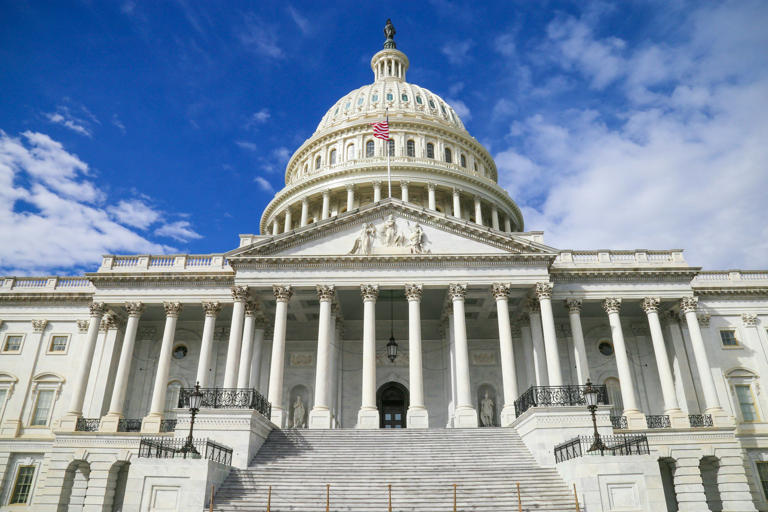U.S. House, CBDC Anti-Surveillance State Act, Federal Reserve, central bank digital currency, digital dollar, cryptocurrency regulation, Tom Emmer, financial innovation, blockchain, crypto market structure
The U.S. House of Representatives passes the CBDC Anti-Surveillance State Act to prevent the Federal Reserve from issuing a digital dollar. Learn about the key details, partisan divide, and implications for the future of digital currencies and financial regulation in the United States.

The U.S. House of Representatives recently voted to prevent the Federal Reserve from issuing a central bank digital currency (CBDC), marking a significant move in the ongoing debate over digital financial systems. The CBDC Anti-Surveillance State Act, introduced by Majority Whip Tom Emmer (R-Minn.), aims to block the U.S. central bank’s efforts to develop a digital dollar. This decision has sparked a polarized response from lawmakers and the public alike.
Background of the CBDC Debate
A central bank digital currency is a digital form of a country’s fiat currency, issued and regulated by the central bank. Proponents argue that a CBDC could provide a safer, more efficient payment system, potentially reducing the reliance on private cryptocurrencies and enhancing financial inclusion. However, critics fear that a CBDC could lead to increased government surveillance and control over financial transactions.
The CBDC Anti-Surveillance State Act
The CBDC Anti-Surveillance State Act reflects the Republican stance against the potential issuance of a U.S. CBDC. Majority Whip Tom Emmer, the bill’s sponsor, has been vocal about his concerns regarding government overreach and the possible infringement on individual privacy that a CBDC could entail. The Act seeks to ensure that the Federal Reserve does not move forward with any plans to implement a digital dollar, thus addressing fears of a surveillance state where the government could monitor and control financial activities.
The House Vote
The vote in the House of Representatives saw a clear partisan divide. Out of the total votes, 213 Republicans and three Democrats supported the bill, while 192 Democrats opposed it. This outcome highlights the contrasting views between the two parties. Republicans emphasize the risk of government control and surveillance, while Democrats argue that these concerns are exaggerated and that banning a CBDC would stifle public sector innovation and research.
Comparison with the Financial Innovation and Technology Act
The vote on the CBDC Anti-Surveillance State Act came a day after another significant legislative development. The House passed the Financial Innovation and Technology for the 21st Century Act (FIT21), a bill aimed at defining the regulatory framework for the crypto market. This bill, which saw bipartisan support with 71 Democrats joining 208 Republicans, grants the U.S. Commodity Futures Trading Commission (CFTC) greater authority over digital assets and outlines the role of the Securities and Exchange Commission (SEC) in the sector.
Industry participants have hailed the passage of FIT21 as a landmark achievement for the cryptocurrency industry in the United States. Kristin Smith, head of the Blockchain Association, an industry lobby group, described the vote as a watershed moment and a sign of Congressional validation for the crypto sector. Nicole Valentine, the director of FinTech at the Milken Institute, echoed this sentiment, calling the passage a “welcome step.”
The Future of the Bills in the Senate
Despite the House’s passage of both the CBDC Anti-Surveillance State Act and the FIT21, their future in the Senate remains uncertain. Currently, there are no corresponding bills in the Senate for either piece of legislation. This lack of counterparts in the Senate suggests that both bills may face significant hurdles before becoming law. The divided nature of Congress means that without broader support or compromise, these bills may not progress further in the legislative process.
Implications of the Anti-CBDC Bill
The passage of the CBDC Anti-Surveillance State Act by the House sends a clear message about the current political climate regarding digital currencies in the United States. The concerns over privacy and government control resonate strongly with many lawmakers, reflecting a broader skepticism about the role of digital currencies issued by central banks.
However, the debate also underscores the challenges of balancing innovation with regulation. While the potential benefits of a CBDC include increased financial inclusion and efficiency, the fears of surveillance and loss of privacy cannot be ignored. This tension is likely to continue as digital currencies evolve and as other countries, such as China, move forward with their own CBDC projects.
Conclusion
The U.S. House of Representatives’ decision to pass the CBDC Anti-Surveillance State Act marks a significant development in the ongoing debate over central bank digital currencies. The partisan divide on this issue highlights the complex interplay between innovation, regulation, and privacy concerns. As the debate moves to the Senate, the future of both the CBDC Anti-Surveillance State Act and the Financial Innovation and Technology for the 21st Century Act remains uncertain. Regardless of the outcome, the discussions surrounding these bills will continue to shape the future of digital currencies and financial regulation in the United States.
Read More-